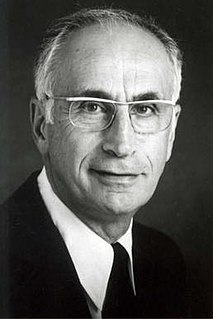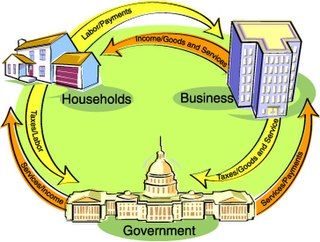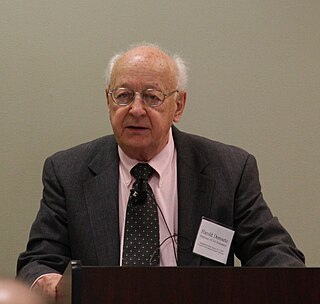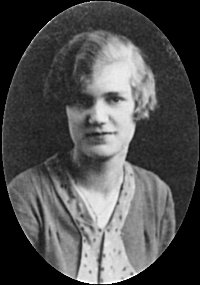Related Research Articles
Sustainable development is the organizing principle for meeting human development goals while simultaneously sustaining the ability of natural systems to provide the natural resources and ecosystem services on which the economy and society depend. The desired result is a state of society where living conditions and resources are used to continue to meet human needs without undermining the integrity and stability of the natural system. Sustainable development can be defined as development that meets the needs of the present without compromising the ability of future generations to meet their own needs. Sustainability goals, such as the current UN-level Sustainable Development Goals, address the global challenges, including poverty, inequality, climate change, environmental degradation, peace, and justice.
Environmental economics is a sub-field of economics concerned with environmental issues. It has become a widely studied subject due to growing environmental concerns in the twenty-first century. Environmental economics "undertakes theoretical or empirical studies of the economic effects of national or local environmental policies around the world.... Particular issues include the costs and benefits of alternative environmental policies to deal with air pollution, water quality, toxic substances, solid waste, and global warming."

Ecological economics, bioeconomics, ecolonomy, eco-economics, or ecol-econ is both a transdisciplinary and an interdisciplinary field of academic research addressing the interdependence and coevolution of human economies and natural ecosystems, both intertemporally and spatially. By treating the economy as a subsystem of Earth's larger ecosystem, and by emphasizing the preservation of natural capital, the field of ecological economics is differentiated from environmental economics, which is the mainstream economic analysis of the environment. One survey of German economists found that ecological and environmental economics are different schools of economic thought, with ecological economists emphasizing strong sustainability and rejecting the proposition that physical (human-made) capital can substitute for natural capital.

Nicholas Kaldor, Baron Kaldor, born Káldor Miklós, was a Cambridge economist in the post-war period. He developed the "compensation" criteria called Kaldor–Hicks efficiency for welfare comparisons (1939), derived the cobweb model, and argued for certain regularities observable in economic growth, which are called Kaldor's growth laws. Kaldor worked alongside Gunnar Myrdal to develop the key concept Circular Cumulative Causation, a multicausal approach where the core variables and their linkages are delineated. Both Myrdal and Kaldor examine circular relationships, where the interdependencies between factors are relatively strong, and where variables interlink in the determination of major processes. Gunnar Myrdal got the concept from Knut Wicksell and developed it alongside Nicholas Kaldor when they worked together at the United Nations Economic Commission for Europe. Myrdal concentrated on the social provisioning aspect of development, while Kaldor concentrated on demand-supply relationships to the manufacturing sector. Kaldor also coined the term "convenience yield" related to commodity markets and the so-called theory of storage, which was initially developed by Holbrook Working.

Clive Charles Hamilton AM FRSA is an Australian public intellectual and Professor of Public Ethics at the Centre for Applied Philosophy and Public Ethics (CAPPE) and the Vice-Chancellor's Chair in Public Ethics at Charles Sturt University. He is a member of the Board of the Climate Change Authority of the Australian Government, and is the Founder and former Executive Director of The Australia Institute. He regularly appears in the Australian media and contributes to public policy debates. Hamilton was granted the award of Member of the Order of Australia on 8 June 2009 for "service to public debate and policy development, particularly in the fields of climate change, sustainability and societal trends".

Douglass Cecil North was an American economist known for his work in economic history. He was the co-recipient of the 1993 Nobel Memorial Prize in Economic Sciences. In the words of the Nobel Committee, North and Fogel "renewed research in economic history by applying economic theory and quantitative methods in order to explain economic and institutional change."

Genuine progress indicator (GPI) is a metric that has been suggested to replace, or supplement, gross domestic product (GDP). The GPI is designed to take fuller account of the well-being of a nation, only a part of which pertains to the size of the nation's economy, by incorporating environmental and social factors which are not measured by GDP. For instance, some models of GPI decrease in value when the poverty rate increases. The GPI separates the concept of societal progress from economic growth.
A green economy is an economy that aims at reducing environmental risks and ecological scarcities, and that aims for sustainable development without degrading the environment. It is closely related with ecological economics, but has a more politically applied focus. The 2011 UNEP Green Economy Report argues "that to be green, an economy must not only be efficient, but also fair. Fairness implies recognizing global and country level equity dimensions, particularly in assuring a Just Transition to an economy that is low-carbon, resource efficient, and socially inclusive."

William Jack Baumol was an American economist. He was a professor of economics at New York University, Academic Director of the Berkley Center for Entrepreneurship and Innovation, and Professor Emeritus at Princeton University. He was a prolific author of more than eighty books and several hundred journal articles.

Armen Albert Alchian was an Armenian-American economist. He spent almost his entire career at the University of California, Los Angeles (UCLA). A major microeconomic theorist, he is known as one of the founders of new institutional economics and widely acknowledged for his work on property rights.
Peter Thomas Bauer, Baron Bauer, FBA was a Hungarian-born British development economist. Bauer is best remembered for his opposition to the widely-held notion that the most effective manner to help developing countries advance is through state-controlled foreign aid.
Béla Alexander Balassa was a Hungarian economist and professor at Johns Hopkins University and a consultant for the World Bank.

Alvin Harvey Hansen was an American economist who taught at the University of Minnesota and was later a chair professor of economics at Harvard University. Often referred to as "the American Keynes", he was a widely read popular author on economic issues, and an influential advisor to the government on economic policy. Hansen helped create the Council of Economic Advisors and the Social Security system. He is best remembered today for introducing Keynesian economics in the United States in the 1930s and 40s.

Harold Demsetz was an American professor of economics at the University of California at Los Angeles (UCLA).
John Ernest Vaizey, Baron Vaizey was a British author and economist, who specialised in education.

Ester Boserup was a Danish economist. She studied economic and agricultural development, worked at the United Nations as well as other international organizations, and wrote seminal books on agrarian change and the role of women in development.

Degrowth is a term used for both a political, economic, and social movement as well as a set of theories that critiques the paradigm of economic growth. It is based on ideas from a diverse range of lines of thought such as political ecology, ecological economics, feminist political ecology, and environmental justice, pointing out the social and ecological harm caused by the pursuit of infinite growth and Western "development" imperatives. Degrowth emphasizes the need to reduce global consumption and production and advocates a socially just and ecologically sustainable society with social and environmental well-being replacing GDP as the indicator of prosperity. Hence, although GDP is likely to shrink in a degrowth scenario, this is not the primary objective of degrowth.

Frank Horace Hahn FBA was a British economist whose work focused on general equilibrium theory, monetary theory, Keynesian economics and monetarism. A famous problem of economic theory, the conditions under which money can have a positive value in a general equilibrium, is called "Hahn's problem" after him.
Derek Salman Pugh was a British psychologist, business theorist and Emeritus Professor of International Management at the Open University, known for his work in the field of organisational development (OD), and particularly the Pugh Matrix, a tool within OD.
Edward J. Nell is an American economist and a former professor at the New School for Social Research. Nell was a member of the New School faculty from 1969 to 2014. He achieved the rank of Malcolm B. Smith Professor of Economics in 1990.
References
- ↑ Quah, Euston (7 November 2014). "EJ Mishan obituary". The Guardian. Retrieved 4 December 2014.CS1 maint: discouraged parameter (link)
- ↑ Mishan, Ezra J., The Costs of Economic Growth, Staples Press, 1967.
- ↑ Turner, Derek (2006). "The Costs of Economic Growth Ezra J. Mishan - Derek Turner interview". The Social Contract Volume 17, Number 1. Retrieved 17 October 2012.CS1 maint: discouraged parameter (link)
- ↑ "Review of The Economics of Underdevelopment", Economica 27 (May 1960).
- ↑ Veldman, Meredith, Fantasy, the Bomb, and the Greening of Britain, Cambridge University Press, 1994, pp 252-8.